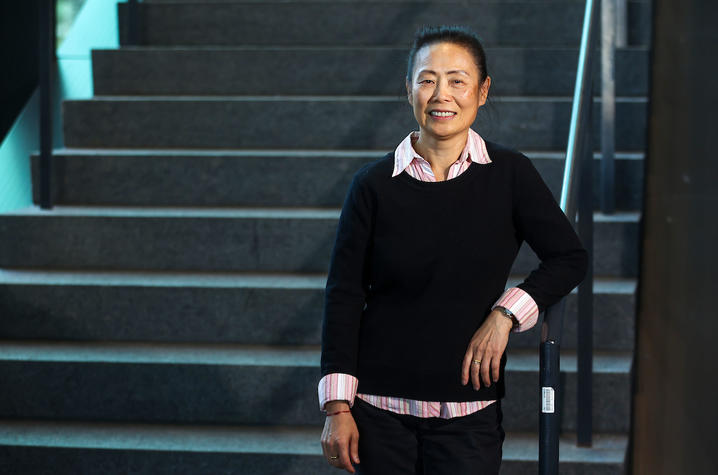UK HealthCare Women's History Month Q&A: Wang-Xia Wang

Women’s History Month is a nationally recognized observance that commemorates the role of women throughout American History. Though its roots as a national celebration trace back to 1981, the presidential proclamation of every March as Women’s History Month officially began in 1995. This proclamation is an opportunity to celebrate the contributions of women to the United States and recognize specific achievements by women throughout history.
LEXINGTON, Ky. (March 20, 2024) — Every week in March, we will offer perspectives on this national observance and their own life experiences from women at UK HealthCare. This week’s Q&A features Wang-Xia Wang, Ph.D., a researcher with the Sanders-Brown Center on Aging and an assistant professor in the UK College of Medicine’s Department of Pathology and Lab Medicine.
Q: What does Women’s History Month mean to you?
Wang: Honor the past, empower the future. This celebration is to honor numerous woman trailblazers who opened the path for us. This celebration is also an inspiration that we should continue carrying the torch to empower women, and to achieve a better equity for women in science, in medicine, and in society.
Q: Who are the women that have inspired or influenced you the most, and why?
Wang: My mother, Baozhen Huang, inspired me to become a scientist and become who I am as a person. As a nurse practitioner in the '50s and '60s in China, my mother faced lots of sexism, abuses, and hardships in her profession and personal life. But she never gave up her belief in education and her curiosity in science and technology.
During China’s Culture Revolution period, my parents were exiled and worked in the ‘reform through labor’ program. The place where my family lived was far from school, so young children were not able to attend school. My mother took initiative and became a teacher in this remote forestry work station. She was the only teacher teaching both first and second grade students in the same classroom. While teaching the first graders, the second graders would do their school work and vice versa.
She taught me many things, but the most she taught me was the fascinating natures that science reveals, and how significant science and technology impacts the quality of human life. She utilized very limited resources to do her crop breeding experiments. I fondly remember how she did cross-pollination among different crops and selected the better plants for next season.
My mother’s teaching and my childhood memories instigated my own curiosity, love of science and pursuit of a science career. She was so proud when I earned my Ph.D. degree. My mother was a resilient, courageous, strong woman, and my forever role model.
Q: What are some of the challenges you've faced as a woman in your profession, and how have you navigated them?
Wang: I became a single mother of two when my husband passed away. Two years later, my children and I moved to the United States and I continued my postdoc training here in the University of Kentucky. Being a single mother in a highly competitive research field, I had a lot on my plate. With raising children alone and a demanding career in a new foreign country, I knew I had to prioritize my focus, time and energy.
It was also a constant mental stress knowing that many of my classmates, friends, junior colleagues were way ahead of me in advancing their careers. It’s hard not to feel discouraged. But I know I am not the only scientist who is a single mother or a single father. I know numerous single parents make a successful career while raising children alone.
Luckily, I believed in myself that if other people could do it, I could do it too. It was a lot of hard work, struggles and frustrations in balancing work and home, but I made it. I also want to shout out to my colleagues, friends, especially my supervisor/mentor Dr. Peter Nelson, who allowed me a more flexible work time when the children were young.
Like many immigrants from different cultures, I feel I need to work harder and put extra efforts to reach career and life goals. It is a continuous process of learning, accepting, integrating and adapting. I adore my English-mother-tongue colleagues and friends for their beautiful speeches, talks, or even just a joke; for their concise, strong writing of a grant application or a manuscript, while I struggle to find a right word to express myself. The songs, books and movies that my American colleagues and friends grew up with are mostly unfamiliar to me. I ask for a lot of explanation of a menu to order food or a drink in a western-style restaurant. I still get the feeling of "not good enough" at times. This feeling is no fun, but is also my motivation to learn, accept, integrate, adapt and expand.
UK HealthCare is the hospitals and clinics of the University of Kentucky. But it is so much more. It is more than 10,000 dedicated health care professionals committed to providing advanced subspecialty care for the most critically injured and ill patients from the Commonwealth and beyond. It also is the home of the state’s only National Cancer Institute (NCI)-designated Comprehensive Cancer Center, a Level IV Neonatal Intensive Care Unit that cares for the tiniest and sickest newborns and the region’s only Level 1 trauma center.
As an academic research institution, we are continuously pursuing the next generation of cures, treatments, protocols and policies. Our discoveries have the potential to change what’s medically possible within our lifetimes. Our educators and thought leaders are transforming the health care landscape as our six health professions colleges teach the next generation of doctors, nurses, pharmacists and other health care professionals, spreading the highest standards of care. UK HealthCare is the power of advanced medicine committed to creating a healthier Kentucky, now and for generations to come.




